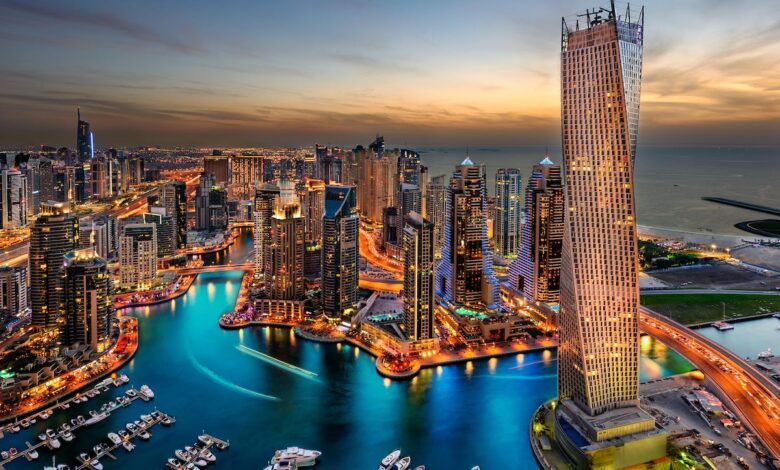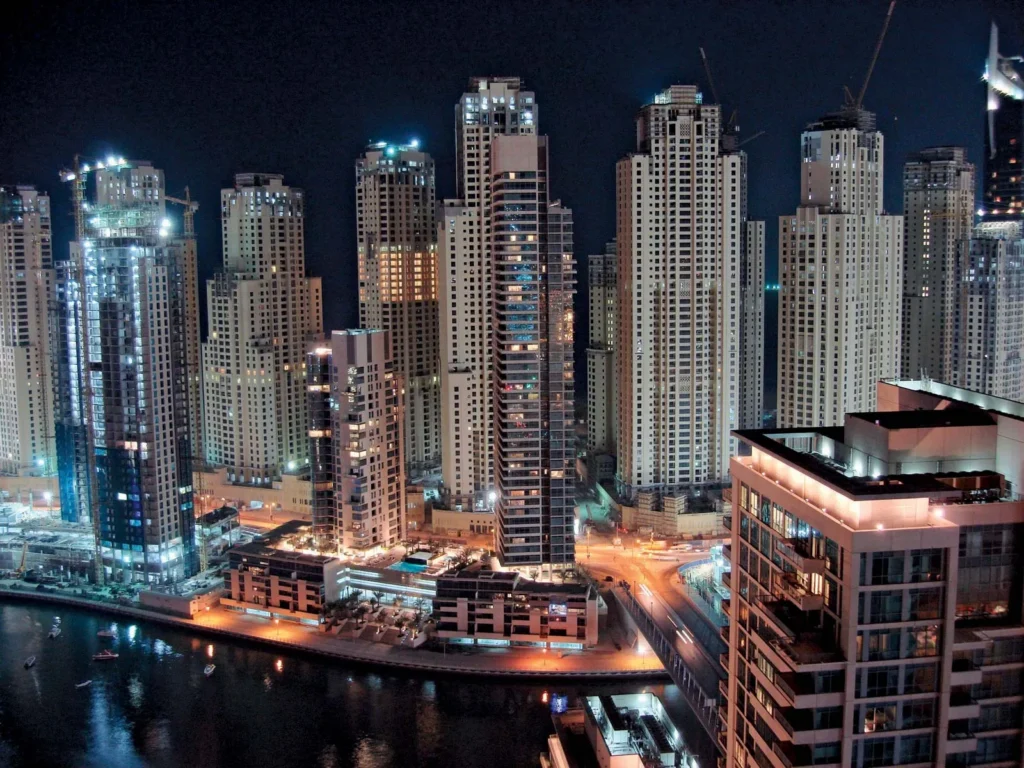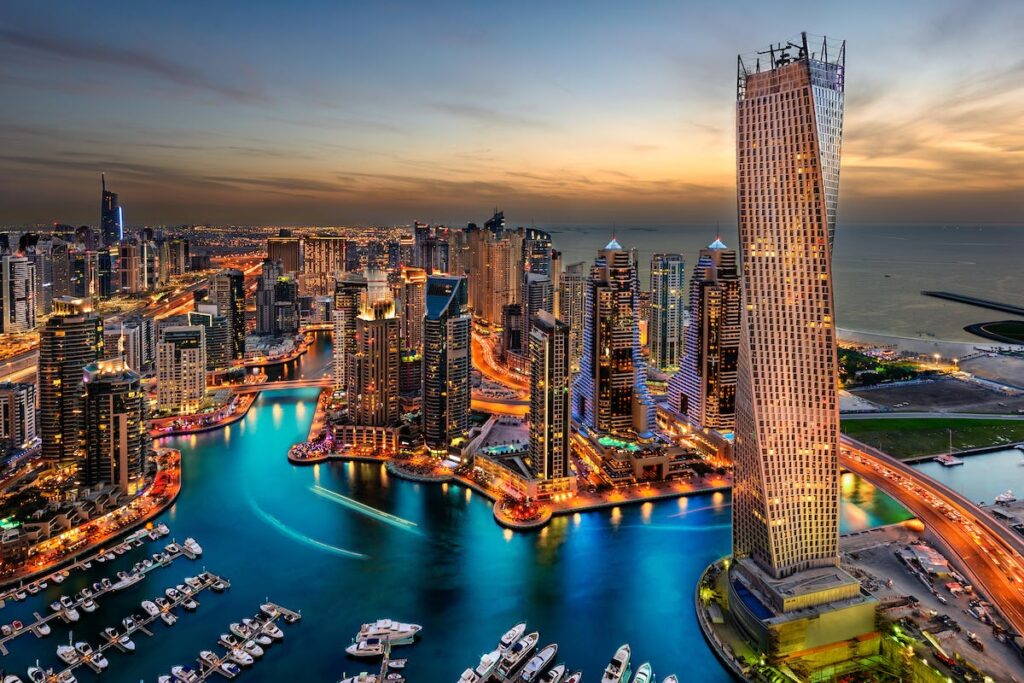Dubai

Dubai, the vibrant and bustling city known for its futuristic skyline and luxurious lifestyle, has a remarkable journey that traces back to its humble beginnings as a fishing village. Today, it stands as the most populous city in the United Arab Emirates (UAE) and the capital of the Emirate of Dubai, showcasing an amalgamation of rich history, modern architecture, and cultural diversity.
Dubai’s transformation from a modest fishing village to a global metropolis is a captivating tale of vision, determination, and strategic planning. This vibrant city on the eastern Arabian Peninsula, nestled along the shores of the Persian Gulf, has evolved into a center for trade, commerce, and tourism, attracting visitors from around the world.



Early Foundations
From Fishing Village to Trading Hub
Established in the 19th century as a small fishing village, Dubai’s earliest roots lie in the serene waters of the Arabian Gulf. However, the city’s destiny took a dramatic turn in the early 20th century when it emerged as a regional trading hub. The strategic location along international trade routes played a pivotal role in Dubai’s ascension, propelling it into the ranks of prominent trading centers.
The Rise of Tourism and Luxury
Dubai’s narrative took another leap forward in the late 20th and early 21st centuries as it embraced tourism and luxury with open arms. The city boasts an impressive array of five-star hotels, holding the distinction of having the second-highest number of such hotels globally. Moreover, the iconic Burj Khalifa, soaring to a height of 828 meters (2,717 feet), stands as an architectural marvel and a symbol of Dubai’s modernity.
Architectural Marvels
The Tallest Jewel: Burj Khalifa
Dubai’s skyline is punctuated by the awe-inspiring Burj Khalifa, an engineering marvel that commands the cityscape. This towering structure, reaching into the heavens, offers panoramic views of the surrounding landscape and serves as a testament to Dubai’s aspiration for greatness.
The Modernity of Dubai’s Skyline
Beyond the Burj Khalifa, Dubai’s skyline boasts an array of architectural wonders that blend modernity with innovation. From the iconic sail-shaped Burj Al Arab to the palm-shaped Palm Jumeirah, each structure tells a story of Dubai’s pursuit of excellence and its desire to redefine urban living.
A Global Transport Hub
Dubai’s Strategic Location
Dubai’s strategic position along the crossroads of international trade routes has transformed it into a global transport hub. The city’s remarkable connectivity, both in terms of air and sea travel, has enabled it to emerge as a pivotal player in the movement of passengers and cargo across the globe.
The Role of Oil Revenue
While Dubai’s modern image is often associated with glitzy skyscrapers, it’s important to acknowledge the role that oil revenue played in its development. Oil revenue fueled the city’s rapid growth, augmenting its infrastructure, and propelling it into the realm of global commerce.
Economic Powerhouse
Diversification of Economy
Dubai’s journey to becoming an economic powerhouse was not solely reliant on oil. The city’s leadership recognized the importance of diversification and invested in sectors such as trade, tourism, aviation, real estate, and financial services. This diversification strategy not only shielded Dubai from the fluctuations of the oil market but also set the stage for sustainable growth.
The Impact of Trade and Tourism
Dubai’s transformation into a trade and tourism hub has not only contributed to its economic success but has also elevated its international reputation. Its strategic initiatives, such as the establishment of free zones and the hosting of global events, have propelled Dubai into the limelight and attracted business and leisure travelers alike.
Unveiling the Etymology
Tracing the Origins of “Dubai”
The etymology of the name “Dubai” is shrouded in mystery and speculation. Various theories abound, each offering a glimpse into the city’s linguistic heritage. From historical anecdotes to linguistic derivations, the origin of the name adds an element of intrigue to Dubai’s narrative.
Linguistic Speculations
Linguists and historians have proposed multiple explanations for the name “Dubai.” Whether it’s linked to the Arabic word for “money” or derived from references to locusts and slow-flowing creeks, these speculations offer diverse perspectives on the city’s nomenclature.
A Glimpse into History
Ancient Trade and Settlements
Dubai’s history is deeply intertwined with its role as a trade hub through the ages. Archaeological discoveries reveal human settlements dating back to ancient times, showcasing the city’s rich history of trade and cultural exchange with civilizations as distant as the Indus Valley and Mesopotamia.
Dubai’s Pre-Islamic Era
Dubai’s pre-Islamic era is marked by the presence of trading communities and interactions with neighboring regions. The city’s link to the Sumerians, its role as a source of metallic goods, and its evolution as a vital trading post paint a vivid picture of its historical significance.
Pearl Trade and Pre-Oil Period
Pearl trade once defined Dubai’s economy, but the collapse of this industry and the subsequent discovery of oil transformed the city’s trajectory. Dubai’s resilience in the face of economic challenges paved the way for its reinvention as a global center for trade and commerce.
Path to Modernity
Emergence of a Trade Hub
Dubai’s journey to modernity gained momentum in the 20th century as it established itself as a significant regional trade hub. With its strategic location and forward-thinking leadership, the city attracted merchants and traders from various corners of the world, fueling its economic growth.
Establishment of Modern Dubai
The transformation of Dubai from a modest settlement to a bustling metropolis was catalyzed by visionary leadership. Forward-looking policies, such as establishing a free port and encouraging foreign investment, set the stage for Dubai’s emergence as a global business hub.
Infrastructure and Development
Port Rashid: Gateway to Prosperity
One of the cornerstones of Dubai’s growth was the establishment of Port Rashid. This strategic deep-water port facilitated international trade and enabled Dubai to become a vital link in global commerce, fueling the city’s economic prosperity.
Infrastructural Renaissance
Dubai’s rapid development was marked by significant investments in infrastructure. The construction of modern roads, bridges, schools, and hospitals transformed Dubai’s landscape and provided a solid foundation for its emergence as a global city.
The Union and Beyond
The UAE’s Formation
Dubai’s journey was intertwined with the formation of the United Arab Emirates (UAE). Collaborative efforts among emirates culminated in the creation of the UAE in 1971. This union paved the way for a new chapter in Dubai’s history, one characterized by cooperation and collective progress.
The Economic Resurgence
Dubai’s economic resurgence was anchored in diversification and innovation. While oil played a pivotal role in the city’s early growth, strategic planning and investments in trade, tourism, and other sectors helped Dubai establish itself as an economic powerhouse in the modern world.
From Oil to Trade
Oil’s Role in Dubai’s Growth
Oil revenues accelerated Dubai’s development and modernization. However, the city’s leadership recognized the importance of reducing dependence on oil, leading to the diversification of the economy and the emergence of sectors such as tourism, finance, and real estate.
Transition to Trade and Tourism
Dubai’s transition from an oil-dependent economy to a dynamic trade and tourism hub was driven by visionary leadership and strategic planning. The city’s relentless pursuit of excellence, coupled with its openness to innovation and global collaboration, allowed it to redefine its identity on the world stage.
Geography
Dubai, located on the Arab Gulf coast of the United Arab Emirates, sits at an elevation of about 16 meters (52 feet) above sea level. It shares borders with Abu Dhabi, Sharjah, and Oman. Hatta, a smaller area within Dubai, is surrounded by Oman and neighboring emirates. The city is situated on the coast of the Persian Gulf and covers an area of 1,588 square miles. The landscape varies from sandy deserts to coastal plains and even the Western Hajar Mountains.
The terrain is characterized by sandy desert patterns, and the sand is mostly composed of crushed shells and coral, appearing fine and white. Coastal plains with salt crusts transition into dune-covered areas, growing larger and redder in the east. The Western Hajar Mountains, reaching around 1,300 meters, run along Dubai’s border with Oman. Dubai Creek, a natural inlet, has been deepened for ships to pass through.
The climate is a hot desert type. Summers are extremely hot, windy, and humid, with temperatures around 40°C (104°F) and nights at about 30°C (86°F). Winters are mild, with highs of 24°C (75°F) and lows of 14°C (57°F). Rainfall has increased over the years, totaling around 110.7 mm annually. Summers are marked by high humidity and dew points exceeding 30°C (86°F), leading to heat index values surpassing 60°C (140°F). The highest recorded temperature is 49.0°C (120.2°F).
Dubai’s ecosystem includes desert vegetation, wild grasses, date palms, acacia, and ghaf trees. Various animals like striped hyenas, caracals, falcons, and Arabian oryx inhabit the region. The city is also a stopover for migratory birds. The marine life in Dubai’s waters includes over 300 fish species, dolphins, whales, sharks, and endangered turtles.
Overall, Dubai’s geographical features, climate, and biodiversity contribute to its unique environment and status as a global city.
Goverment and demography
Dubai, a constitutional monarchy, has been ruled by the Al Maktoum family since 1833. Citizens participate in electing representatives to the Federal National Council of the UAE. The ruler, Sheikh Mohammed bin Rashid Al Maktoum, is also the Vice President, Prime Minister of the UAE, and a member of the Supreme Council of the Union. Dubai appoints members to the Federal National Council.
The Dubai Municipality, established in 1954, has evolved into the autonomous Government of Dubai, overseeing city planning, services, and facilities. The Government has various departments responsible for security, education, transportation, and more. The Ruler of Dubai issues laws, while executive authority is delegated to the Dubai Executive Council, led by the Crown Prince.
Dubai Police enforces laws, with its jurisdiction separate from the federal judicial system. The judicial courts include instances for civil, criminal, and Sharia law matters. Alcohol is regulated, with legal consumption in designated areas. Dubai has low violent crime rates and was ranked the seventh-safest city globally in 2019.
Concerns about human rights have arisen, particularly regarding labor conditions. Certain actions, like speaking against the royal family, can lead to sanctions. Homosexual acts are illegal, and freedom of speech is limited. There have been criticisms of the treatment of foreign workers.
Dubai has a diverse population, with a small percentage of UAE nationals and a majority of expatriates, mainly Asians. The city has various languages spoken due to immigration. Islam is the state religion, and the government supports mosques. Other religious groups also have places of worship and can practice their faith.
Dubai’s unique governance, legal framework, and demographic diversity contribute to its distinctive character as a global city.
Economy
Dubai, one of the world’s fastest-growing economies, has experienced remarkable economic diversification. While its trading infrastructure initially relied on the oil industry, oil and gas revenues now make up less than 5% of the emirate’s income. The city’s GDP was projected to exceed $177 billion in 2021, with a growth rate of 6.1% in 2014.
Major contributors to Dubai’s economy include real estate and construction (22.6%), trade (16%), entrepôt services (15%), and financial services (11%). Dubai’s oil reserves have significantly decreased and are expected to be depleted within 20 years. The city produces around 50,000 to 70,000 barrels of oil daily and substantial gas from offshore fields, constituting about 2% of the UAE’s total gas revenues.
Dubai’s non-oil foreign trade reached $362 billion in 2014, with significant imports ($230 billion) and notable exports and re-exports ($31 billion and $101 billion, respectively). China became Dubai’s top trading partner in 2014, followed by India, the United States, and Saudi Arabia.
The city has emerged as a global financial and business hub, offering free trade in gold and hosting numerous industry-specific free zones. Dubai Internet City and Dubai Media City are examples of such enclaves, attracting IT and media giants. Additionally, the Dubai Financial Market (DFM) and NASDAQ Dubai are stock exchanges supporting local and international companies.
Dubai’s real estate sector boomed from 2004 to 2006 due to its transition towards a service- and tourism-oriented economy. However, a downturn occurred in 2008-2009, impacting property values and construction due to the global financial crisis.
Tourism is a vital component of Dubai’s economy, with attractions like the Burj Khalifa, extensive shopping centers, and historical souks. The city has also positioned itself as a prominent international tourist destination, hosting over 14.9 million visitors in 2016. Dubai Mall and Dubai Creek are notable shopping and historical districts.
Dubai won the right to host Expo 2020, initially scheduled for October 2020 to April 2021. The event aimed to showcase global cultures and innovations and foster economic development. However, due to the COVID-19 pandemic, Expo 2020 was postponed to October 2021 to March 2022.
Despite its economic successes, Dubai has faced criticism related to labor rights, LGBTQ+ rights, and social issues. The city continues to strive for economic growth, development, and inclusivity.
Transportation
Transport in Dubai is managed by the Roads and Transport Authority (RTA) and has undergone significant improvements. The public transport system faced congestion and reliability issues, but a substantial investment program addressed these concerns. The city has five main road routes and a network of intra-city roads. Public buses are operated by the RTA, with plans for over 2,100 buses. Taxis, easily distinguishable by color-coded roofs, are another essential mode of transport.
Dubai International Airport is a major hub, and a newer airport, Al Maktoum International Airport, is under development. The Dubai Metro, comprising the Red and Green lines, is an automated rail network that opened in 2009. A monorail connects Palm Jumeirah to the mainland, while a tram runs along Al Sufouh Road. Plans also include a high-speed rail system.
Dubai has two major ports, Port Rashid and Port Jebel Ali, and uses waterways like abras and water buses for urban transport. The city has evolved culturally, embracing luxury and leisure, with annual events like the Dubai Shopping Festival. The UAE’s culture is rooted in Arab and Islamic traditions, with a mix of expatriate influences.
Culture
The UAE culture is rooted in traditional Arab and Islamic values, influencing architecture, music, attire, cuisine, and lifestyle. The call to prayer from mosques occurs five times daily. The weekend shifted from Friday-Saturday to Friday afternoon, Saturday, and Sunday in 2022. Dubai’s culture has evolved to emphasize luxury, opulence, and leisure-related extravagance. Entertainment events like the Dubai Shopping Festival and Dubai Summer Surprises attract millions of visitors and generate substantial revenues.
Dubai is renowned for its nightlife, with clubs and bars often found in hotels due to liquor laws. The city’s cultural landscape has diversified due to various ethnic groups and nationalities settling in Dubai. Major holidays include Eid al-Fitr and National Day.
Dubai’s culture of extravagance is evident in its entertainment scene, including the Dubai Opera and annual Dubai International Film Festival. The city also houses a burgeoning contemporary art scene, with galleries contributing to its international reputation. Media in Dubai includes international news agencies, local television channels, and print media outlets.
Cuisine in Dubai is diverse, with Arabic, South Asian, and Chinese offerings. Arabic cuisine is popular, and fast food is widespread. Regulations govern the sale of pork and alcoholic beverages. Dubai hosts the Dubai Food Festival to showcase its gastronomic diversity.
Sports like football, cricket, golf, and tennis are prominent in Dubai, with various international tournaments hosted annually. The Emirati attire consists of traditional robes for men and women, reflecting the culture’s values. While there’s no strict dress code, modesty is expected in public places.
Education
Education in Dubai includes public and private schools, offering various curricula like British, Indian, and International Baccalaureate. The KHDA regulates education quality and has led to improvements in schools. Prominent universities in Dubai include the American University, Hult International Business School, and University of Wollongong.
Further reading
- Wikipedia – https://en.wikipedia.org/wiki/Dubai
- Britannica – https://www.britannica.com/place/Dubai-United-Arab-Emirates